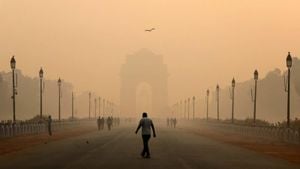Pro-Palestinian protests have surged remarkably across the United States since the tragic events of October 7, 2023, when Hamas conducted its surprise attack on Israel. Over the subsequent months, demonstrators have taken to the streets, campuses, and public squares, claiming their voices represent not just support for Palestine, but broader calls for peace and justice. According to the Crowd Counting Consortium (CCC), during the eight-month period from the date of the attack to June 7, 2024, there were approximately 12,400 pro-Palestinian demonstrations, boasting over 1.5 million participants nationwide.
This figure starkly contrasts with the 2,301 pro-Israel gatherings recorded over the same time frame. While pro-Israel events were fewer, they were still noteworthy considering these gatherings were largely organized as responses to the heightened tensions, particularly focusing on hostages taken during the October incident. About half of these pro-Israel events were conducted through vigils and other sympathetic engagements for the victims of the Hamas attack.
Analyzing the discrepancies between the two movements, CCC posits the differences stem from the US historically positioning itself as a strong ally of Israel. Advocates for Palestine, facing systemic issues and criticism of US policy, found considerable motivation to mobilize public opinion and organize large-scale protests. The CCC's research spans multiple data points including date, location, crowd sizes, number of arrests, police presence, and reports of violence.
Interestingly, pre-April 2024, there was limited pro-Palestinian activity on university campuses, though student involvement remained high. Following April, there was significant growth, with the establishment of solidarity encampments on numerous campuses. By June 2024, 138 universities were reported to host these encampments, influenced by the events at Columbia University where initial protests were met by significant police action.
Statistically, CCC reported around 9,295 arrests during the pro-Palestinian protests, with about 60% occurring off-campus. While different narratives paint the movement as inciting violence, CCC found little evidence pointing to the pro-Palestinian protests being violent, underscored by minimal reported property damage and injuries. The CCC boldly articulated, "the rhetorical core of the pro-Palestinian movement has not been a call for violence against Jews, but rather for the freedom of Palestinians."
Meanwhile, over the Atlantic, the UK has witnessed significant unrest surrounding pro-Palestinian activism, with counter-terrorism police recently arresting ten Palestine Action activists following their protest against Elbit Systems—the largest arms manufacturer supplying Israel. This development highlights the growing tension between police actions and public demonstrations advocating for Palestinian rights. Family members described aggressive raids, with reports of ten activists being handcuffed and taken from their homes by overwhelming police force. Human rights organizations have vocalized their concern, labeling these arrests as evidence of increasing state repression against those engaged in peaceful protest.
Tom Southerden from Amnesty International UK expressed alarm over the apparent misuse of anti-terrorism powers against protesters, emphasizing the need for authorities to redirect their focus on protecting rights rather than suppressing those standing against violence and war crimes. The activists, involved previously under the 'Filton 10' categorization, were initially charged with non-terror related offenses but remain subject to severe legal restrictions, holding many activists under lengthy pre-charge detentions.
Protests and public sentiment surrounding the Palestinian cause have increasingly gained momentum globally. Reports from across Europe indicate significant demonstrations, highlighting international solidarity with the plight of Palestinians facing conflict and humanitarian crises. Recent protests have erupted across cities like Paris, London, and Berlin, where thousands have gathered to call for justice and increased governmental action to end the violence.
Notably, these events have also garnered mixed reactions from political figures and institutions. While many local leaders have openly supported the demonstrations, there are rising tensions fueled by narratives framing protests as threatening public safety, leading to increased policing of demonstrations. Some political commentators contend this could dangerously escalate as increasingly aggressive laws surrounding public protests are drafted and enforced.
On university campuses, the narrative continues to evolve. Many students view the surge of campus activism as interconnectedly linked to the broader climate of social justice movements throughout the country. More students are advocating openly, using educational institutions as platforms to mobilize voices for change. This, combined with widespread digital advocacy through social media, serves to amplify calls for awareness surrounding Palestine, framing it as not only a national but moral concern.
The backlash against these movements, particularly accusations of anti-Semitism tied to certain chants or slogans—such as "from the river to the sea"—highlights the tension surrounding free speech and protest rights versus accusations of hate speech. This predicament forces activists to navigate the murky waters of expression as they work to rally support without alienation.
Reports of violence, including isolated incidents during protests, exist, but accounts of demonstrators facing violence from counter-protesters or police are more common. For example, recent events at Yale involved pro-Israel individuals allegedly injuring Jewish students. This ripple effect highlights the complexity and intensity of the political discourse surrounding the Israeli-Palestinian conflict.
Despite criticism and scrutiny, the consistent theme across all protests remains centered around asserting rights—both for Palestinians and anti-war sentiments globally. The cumulative impact of these protests could signify more substantial shifts within the political framework toward foreign policy, particularly as younger generations push for discussions centering around equity, justice, and recognition of rights. Time will tell how the inequities and concerns raised through these protests will reshape political landscapes not just at home but also on the global stage.



